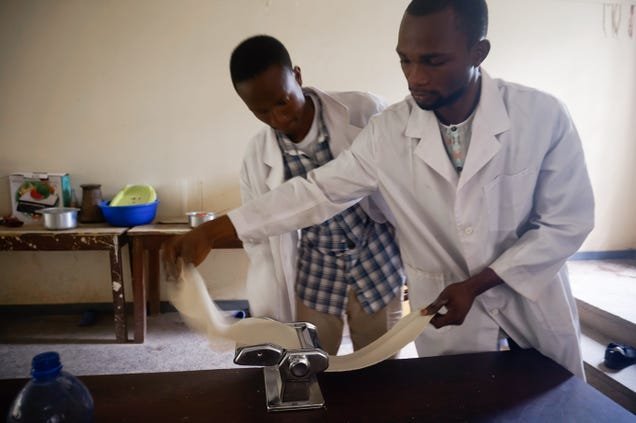Every morning, Madeleine Kombozi, 38, sets up a stall in front of the Institut Chololo, a technical school in the Makiso commune in the center of Kisangani in the Democratic Republic of Congo. She turns on the hob and begins cooking pasta, known locally as spaghetti, for students and passersby.
Kombozi, a mother of five, is one of many women who make a living in the streets of Kisangani by selling spaghetti, a popular breakfast among the Boyomese, as Kisangani residents are known. But she’s probably the only one who cooks spaghetti made from cassava flour.
War in Ukraine and wheat shortages
After working as a street food vendor for over two years, Kombozi switched from wheat to cassava spaghetti when Russia’s invasion of Ukraine disrupted global grain markets and drove up prices.
DRC imports nearly all of its wheat. Cassava, on the other hand, is widely available in the region.
Kombozi buys her cassava spaghetti from a small manufacturing plant set up in the University of Kisangani by a group of biotechnology students who hope their experiment will help offset wheat shortages.
Enabel, the Belgian government’s development agency, donated the equipment, and 10 students work on a volunteer basis, advised by professor Onauchu Didy.
“I am very proud of these students, who learned to mix business with pleasure in order to ensure spaghetti remains available for housewives,” Didy says.
Each day, the students can produce over 100 packets of 250 grams (9 oz) each, which they sell for 1,000 Congolese francs (49 cents). In Kisangani, a similar size package of wheat spaghetti sells for up to 30,000 francs ($14.77).
“We are already supplying spaghetti to restaurant owners and other merchants,” says Jonathan Sembaito, 28, a student.
Sembaito grants that the work isn’t easy, as the production is entirely manual. “We have to purchase the manioc [cassava] from 10 to 11 months before, and then we have to dry it in the sun because we do not have dryers,” he says.
The packaging is made of paper imported from Uganda—to combat non-biodegradable waste and mitigate environmental pollution, Sembaito says—and delivery delays can also slow down the process.
Chantal Baimoli, a housewife who purchases the cassava spaghetti, is happy about the innovation: “It allows us to have a local spaghetti, and it makes me very proud because there is no taste difference. My children really like it.”
While 25 kg (55 pounds) a day will hardly supply a city of 1.37 million, Kombozi’s clients at least are pleased. “They eat without complaining,” she says. “They have never mentioned the different tastes.”
This story was originally published by Global Press Journal.








